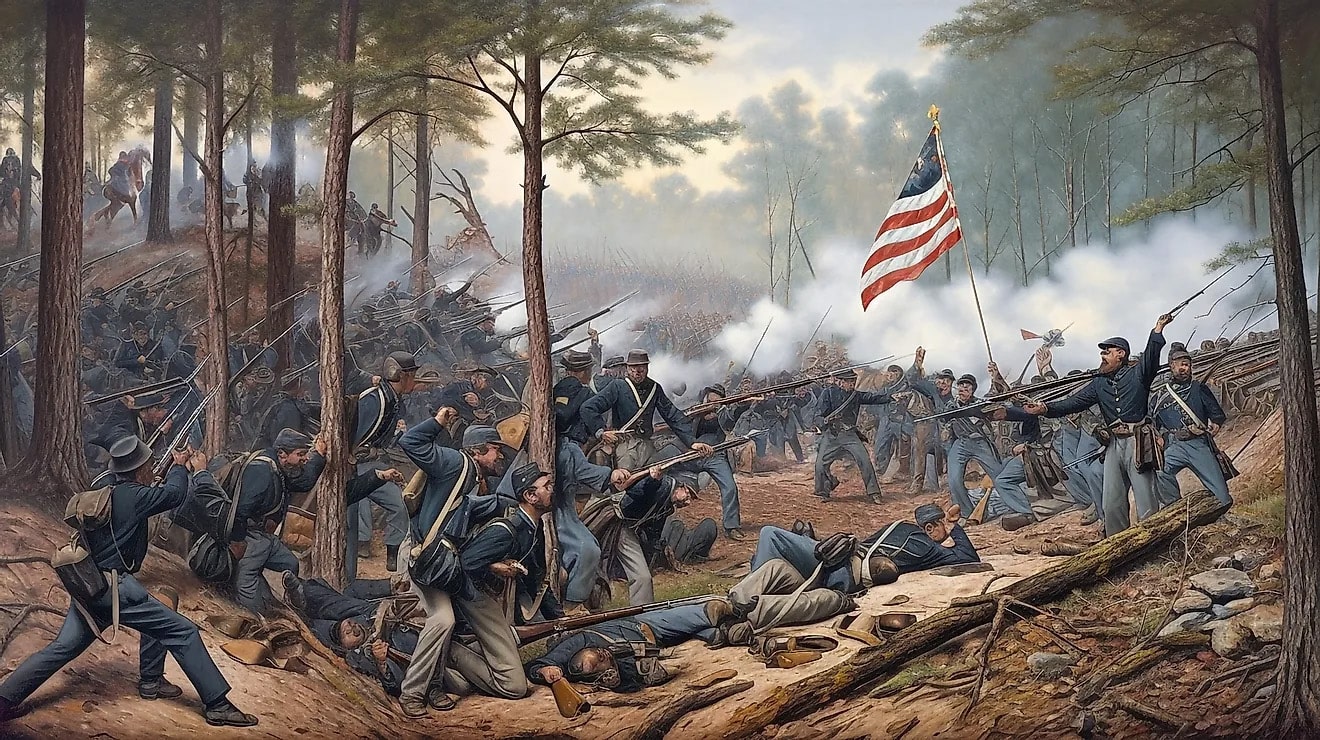
22 interesting facts about American Civil War
- 👁️ 408
The American Civil War, a pivotal conflict in the history of the United States, was fought from 1861 to 1865. This war, rooted in complex issues such as states’ rights, economic disparities, and, most profoundly, the moral and legal questions surrounding slavery, fundamentally transformed the nation. It not only led to the abolition of slavery but also set the stage for the Reconstruction era, reshaping the United States’ social, political, and economic landscapes. The war brought about significant technological advancements and strategic innovations in military history. Here are 22 interesting and informative facts about the American Civil War that offer insight into its impact, complexity, and the legacy it left behind.
- The Civil War began on April 12, 1861, when Confederate forces fired on Fort Sumter in South Carolina.
- It ended on April 9, 1865, with General Robert E. Lee’s surrender to General Ulysses S. Grant at the Appomattox Court House in Virginia.
- The conflict was fought over 10,000 named battles across the entire country, from Vermont to Arizona.
- Over 620,000 soldiers lost their lives in the war, making it the deadliest conflict in American history.
- The Civil War was also known as the War Between the States, the War of the Rebellion, and the War for Southern Independence.
- The Emancipation Proclamation, issued by President Abraham Lincoln on January 1, 1863, declared all slaves in Confederate-held territory to be forever free but did not immediately free a single slave.
- The first Medal of Honor in U.S. history was awarded during the Civil War, in 1863.
- The war led to significant advancements in medical treatment and surgery due to the high number of casualties.
- It was one of the first major wars to be extensively photographed, providing a visual record of the conflict and its participants.
- The Union and the Confederacy used hot air balloons for reconnaissance, marking the first military use of balloons in the United States.
- The Civil War prompted the United States to create a national currency for the first time, introducing paper money known as “greenbacks.”
- Approximately one in four soldiers who went to war never returned home, making it the most devastating in terms of American casualties.
- The Battle of Gettysburg was the deadliest battle of the Civil War, with around 51,000 casualties in just three days.
- Women played crucial roles during the war, serving as nurses, spies, and even soldiers disguised as men.
- African American soldiers fought bravely on both sides of the war, with nearly 200,000 serving in the Union Army and Navy.
- The Civil War saw the introduction of ironclad ships, a significant innovation in naval warfare.
- The Confederate States of America consisted of 11 southern states that seceded from the Union.
- The Homestead Act of 1862, which provided free land to settlers in the West, was passed during the Civil War.
- President Abraham Lincoln was assassinated by John Wilkes Booth, a Confederate sympathizer, just days after the war’s conclusion.
- The National Cemetery System in the United States was established during the Civil War to provide a dignified final resting place for fallen soldiers.
- The war significantly impacted the U.S. economy, leading to rapid industrialization in the North.
- The Reconstruction era that followed the Civil War attempted to address the inequalities of slavery and its political, social, and economic legacy but faced significant challenges and resistance.
The American Civil War was a defining moment in the nation’s history, reshaping the United States in ways that continue to influence it to this day. Its legacy is complex, reflecting the deep divisions and profound questions about freedom, justice, and unity that it sought to address. The war’s profound human cost and the bravery of those who fought for their beliefs remind us of the enduring impact of conflict on societies and the importance of striving for a more just and equitable world.
The American Civil War, a pivotal conflict in the history of the United States, was fought from 1861 to 1865. This war, rooted in complex issues such as states’ rights, economic disparities, and, most profoundly, the moral and legal questions surrounding slavery, fundamentally transformed the nation. It not only led…